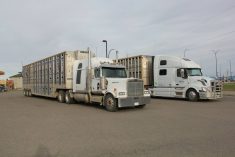REGINA – At good stock dog trials, people expect to see hard-working, quality dogs.
But it also requires good sheep.
The ones brought in for the International Stock Dog Championships at Canadian Western Agribition drew considerable praise.
“I think the sheep are really consistent to everybody this year,” said Dale Montgomery of Maple Creek, Sask., who has been competing in the event since its inception at Agribition in 1990.
“Other years it has been a little bit of a problem.”
The flock of sheep for this year’s Nov. 25 event was rented from Norm and Bev Sommer of Pleasantdale, Sask., who run 235 ewes.
Read Also

Petition launched over grazing lease controversy
Battle continues between the need for generation of tax revenue from irrigation and the preservation of native grasslands in southern Alberta rural municipality.
“These sheep are showcasing the skills of the handler and dog. Ideally, that’s what you want,” said Bev.
“If you and your dog are right on your game, the sheep are going to go wherever you want them to.
“It’s ideal. The sheep aren’t fighting the dogs. There’s no reason to bite any of them because they respond.”
According to Bev, the sheep at the Sommer’s farm are dog-wise. They respect working dogs and are accustomed to their presence.
Bev said she and Norm work their nine Border Collies every day, moving sheep to pasture, running them through chutes and holding them back from grain.
To prepare their own dogs for the stock dog trials, the Sommers train their dogs to listen, take commands and stop on command.
A good handler must always have the dog under control.
Montgomery said 56 dogs were entered in the trials this year, up from the cutoff of 45.
“We’ve been filled other years but it seems this year we had a lot of entries.
In addition to a rising number of dog handlers, Montgomery said the demographics are also changing.
“It used to be more diehards that got into it at the start, but now there’s more young people getting into it from agricultural backgrounds,” he said.
“Some are wives that came to watch, but now are running their own dogs.”
As the number of stock dog entrants rises, the availability of sheep-wise flocks has been decreasing.
“One hundred fifty sheep will do a complete go around. You want three different sheep with each dog and then they’ll be rerun on the second go around.”
The Sommers brought 163 ewes to the event.
“There’s a few spares in case any got hurt on the semi-truck coming here or gets hurt here,” said Bev.
“We went through them pretty thoroughly to make sure that just the best came,” added Norm.
This is the first time the Sommers, who also compete, rented out their flock for the event.
“For me, I always worry about people complaining. You want people to be happy with what you’ve brought,” said Bev.
“You can pick up on the people’s vibes. Everybody’s happy with the sheep. I think people feel good if they can get a run. If the sheep are so difficult that you can’t get a run put together, then it’s frustrating. This way, everybody’s getting a good run and everybody’s happy.”
“It’s good for the spectators,” she added.
“They can see the run being completed and they’re happy. If the sheep are fighting all the time then it’s not as good.”















